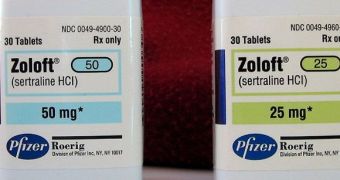A new investigation, conducted on yeast cells, reveals more clues about how antidepressants work. The results also appear to suggest that problems with the neurotransmitter serotonin are not the sole cause of depression.
This particular finding is very important, since it may open new avenues of research for treating this condition. What Princeton University investigators were especially interested in in this study was the self-degradation response to the antidepressant Zoloft, that yeast cells started displaying after a while.
The study – published in the latest issue of the journal PLoS ONE – reveals that the active ingredient of Zoloft (sertraline) acts even on the membrane of cells that do not contain serotonin, its main target. This suggests that antidepressants trigger pharmacological activity beyond regulating serotonin.
“Zoloft accumulates within an organism lacking serotonin and induces autophagy, […] a protective mechanism cells use to recycle excess or damaged cell membrane,” says Princeton Lewis-Sigler Institute for Integrative Genomics Associate Research Scholar, Ethan Perlstein.

 14 DAY TRIAL //
14 DAY TRIAL //